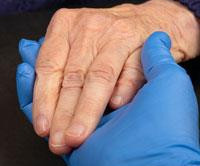Navigating Backup Care During COVID-19
Do you need to hire in-home care for an aging loved one while you return to work onsite? Do you need a babysitter for the children now that school is out, and summer camp options are limited? Are you providing care for a family member and have concerns about how best to protect their well-being in our new normal?
Caregiving can be a challenge during the best of times. Meeting your backup care needs during a global pandemic can be even more stressful if you don’t have the right resources to guide you. Penn is here to help you navigate your child, adult, and senior care needs by offering resources and tips for finding and providing care during the coronavirus outbreak.
Care.com
Penn’s Backup Care program offers benefits-eligible faculty and staff up to 10 days of backup child or adult care per fiscal year through Care.com. Care can be offered in your home, with some of the cost covered through a subsidy program that depends on your annual base salary, and other factors that include the number of hours you arrange and whether special needs exist.
Care.com puts you in touch with professionals who meet your family’s specific needs and expectations. The Care.com team can help you find and hire caregivers through a personal assisted search. Right now, one of the greatest concerns is allowing caregivers into the home, so Care.com has compiled a set of Guidelines for In-home Backup Care for families.
Care.com specialists encourage you to have proactive conversations with potential and existing caregivers about your safety expectations. When vetting child caregivers, Care.com recommends that you ask several COVID-related questions in addition to the usual inquiries. For example:
- Can you follow handwashing and hygiene practices? You may have set rules regarding handwashing and the use of hand sanitizer when your children come inside from playing, before and after eating, and after using the bathroom. Ask a prospective caregiver if she would be comfortable with your practices and the timing of each.
- Are you comfortable with following the current limitations when caring for kids outside of the house? Will a caregiver practice social distancing? If you want your kids to play only in the backyard or on the front porch, and not at a nearby park, consider whether the caregiver is willing to adjust to these boundaries.
- Do you agree to communicate about illness or symptoms? As part of two-way communication, the caregiver should agree to report any symptoms of illness to you to determine whether the care should continue. If your child becomes sick, the caregiver should let you know immediately and take the child’s temperature as soon as possible.
For more information, check out the Care.com article “4 Questions to Ask Child Caregivers During Coronavirus.”
Caring for Seniors
Penn offers Senior Care Planning services through Care.com that allow you to access senior care advisors. Advisors offer caregiving strategies such as finding the appropriate level of care, proactively planning and paying for care, and assisting adult children whose parents do not want to accept care. Senior Care Planning services also allow for free in-depth consultations with a Geriatric Social Worker.
Adults 65 and older are especially vulnerable when it comes to fighting the coronavirus. Health Advocate, a free and confidential service offered through Penn, provides some important tips for caregivers of older loved ones. These include:
- Follow local recommendations for social distancing.
- Wash your hands frequently with soap and water for at least 20 seconds before and after providing care, preparing food, using the bathroom or touching surfaces in public.
- Put off non-essential travel that would expose older adults to crowds, such as cruises or trips with itineraries.
- Help seniors stay connected by showing them how to video chat with others using smartphones, laptops or tablets.
- Encourage friends and family outside of your household to telephone, write notes or send cards.
For more tips, review Health Advocate’s COVID-19:Caring for Older Adults.
For more information about Penn’s dependent care benefits, visit the Caring for Your Family webpage.





